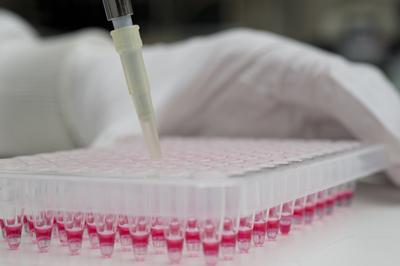Pioneering genetic test gives young patient a diagnosis after ten-year wait

A pioneering genetic test being trialled by doctors in Southampton has led to the discovery of a rare immune deficiency in a ten-year-old boy that has led to multiple infections throughout his life.
Mathew Knight, from Bridport, received the diagnosis in three weeks after his family agreed to give blood samples for DNA analysis following his admission to Southampton Children’s Hospital due to a hip infection.
As a result of the finding, he is now receiving injections to boost his immunity against a group of bacteria known as mycobacteria – which commonly cause lung symptoms, fever and weight loss – for the first time.
The research was part of a project led by University Hospital Southampton NHS Foundation Trust (UHS), the Wessex Investigational Sciences Hub Laboratory (WISH Lab) and the NIHR/Wellcome Trust Southampton Clinical Research Facility.
It formed part of a wider genomic study – the Exome Project – being carried out by UHS, the University of Southampton, Salisbury NHS Foundation Trust and the Wessex Academic Health Sciences Network, to create a diagnostic test for all genes associated with diseases.
The test also highlighted Mathew’s mother Wendy, 50, who has been unwell with infections in the past but to a lesser extent than her son, has the condition.
Mathew’s problems began at just three months old, when he reacted badly to a BCG vaccination and required a hospital admission where he received antibiotic treatment. He suffered multiple infections and hospital admissions from then on but the cause remained a mystery.
“The problem with Mathew’s immune system was due to a deletion in the gene Interferon Gamma Receptor 1 (IFNGR1), which is critical in mounting immune responses to certain types of bacteria, such as the mycobacterial infections,” explained Dr William Rae, a fellow in clinical immunology.
”Due to an inability to respond to interferon gamma correctly, his immune system couldn’t function properly, which is why he has been so susceptible.”
He added: “This diagnosis means he can receive the best possible treatment, directly targeting the problem with regular injections to boost his immunity against mycobacteria, so enabling his body to fight infections.”
Mathew’s father Rees, 51, said now the family know he has a specific immune deficiency, they want to find out as much as possible about it and that they hope their involvement benefits others.
“We know Mathew has a problem with his immune system and we want to find out as much as we can about it,” he said.
“Also, if it does help someone else in the future, all well and good, because there might be another child with the same problem as him and their family doesn’t know about it or the options available to treat it.”
Professor Anthony Williams, director of the WISH Lab, Reader in Clinical Immunology and Allergy at the University of Southampton and an honorary consultant immunologist at UHS, said: “This is an example of where collaborative clinical working across paediatric and adult medicine disciplines, harnessed to integrated scientific endeavour, can provide diagnoses for families that are not possible through currently-available testing.
“A precision diagnosis allows better targeted treatments and a more personalised approach to management of each individual and their family.”
Professor Saul Faust, Professor of Paediatric Immunology & Infectious Diseases at the University of Southampton and director of the NIHR/Wellcome Trust Southampton Clinical Research Facility, added: “Mathew’s case is incredible. To go from a sample to molecular genetic diagnosis in three weeks was sci-fi-like dreaming even just a year ago.
“We are now in a really exciting time for medical and scientific breakthroughs, with initiatives such as the 100,000 Genomes Project meaning tests like this could become a routine part of healthcare in the future.”
The 100,000 Genomes Project is a groundbreaking UK-wide programme to introduce genomics testing for patients with rare diseases and cancer into the NHS.
UHS hosts the Wessex Genomic Medicine Centre and is currently recruiting across more than 50 rare disease areas and eight cancer pathways. Anyone interested in finding out more about the project and how to get involved should visit www.genomicsengland.co.uk.
Press release courtesy of University Hospital Southampton NHS Foundation Trust.